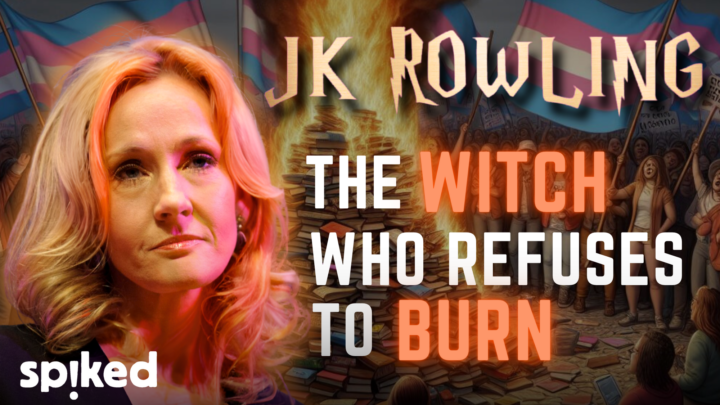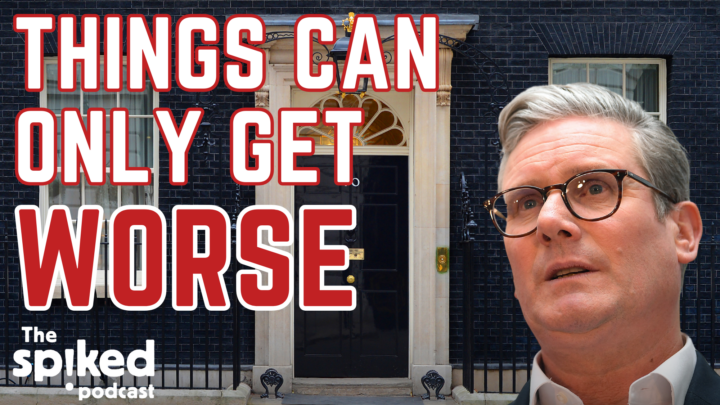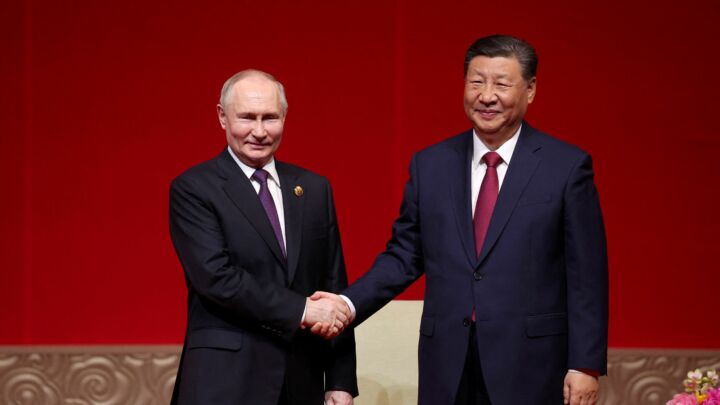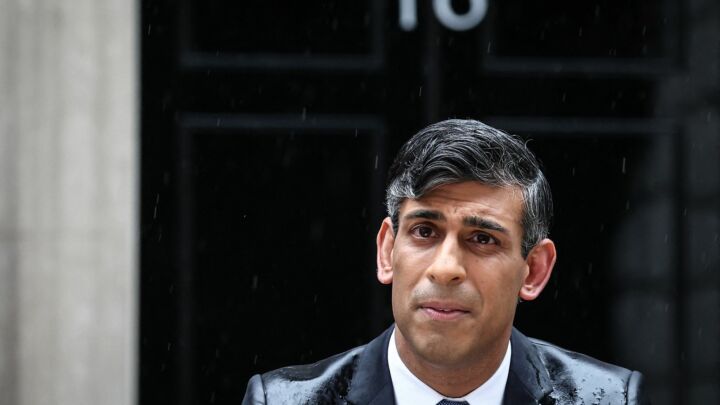
Jews cannot afford to be divided over Israel
Solidarity with the Jewish State has never been more necessary.
Want to read spiked ad-free? Become a spiked supporter.
Jews, like elephants, tend to have long memories. We see in the past warnings of the future. As Israel marks its 76th birthday on 14 May, perhaps the most relevant and terrifying precedent comes from the days of the Roman Empire.
After the First Jewish-Roman War ended in 74 AD, the Jews lost control of Palestine. Their temple was destroyed. Following a second rebellion, they were largely expelled from their promised land. They would not return in force for almost two millennia.
The most thorough account of those times was written by Josephus Flavius, a well-born Jewish priest who first joined the insurrection against Rome, but later embraced the imperial cause. The Israel Josephus describes sounds oddly familiar: a small country with a large diaspora, deeply divided about whether to accommodate the dominant Roman Empire or embrace various strains of zealotry. Many of these zealots spent at least as much time attacking each other as they did the Roman legions. He describes them as ‘falling upon the people as upon a flock of profane animals and cutting their throats’.
Josephus noted that such divisions made the Jews sore losers. When another, even less successful Jewish rebellion against the Romans broke out six decades later, the Jews were left largely exiled from Israel. They were often unpopular, in part due to their monotheistic beliefs, and they sometimes fought with other communities from Rome and Alexandria to Antioch. As the Greek Sibylline oracle proclaimed: ‘Every sea and land is full of you and everyone hates you because of your ways.’
The comparisons are chilling. The modern version of the Jewish State is similarly increasingly isolated. Even in the traditional liberal nations of the diaspora, including the UK, Jewish communities face renewed threats to their prosperity and even their existence. Anti-Semitic hate crimes in Britain, notes one survey, are now 10 times what they were just a few years ago. In the US, they are far more prevalent than the much-ballyhooed threat of Islamophobia.
Under such pressures, solidarity within the tribe could hardly be more necessary. But the Jewish community is increasingly defined by two extremes: the pro-Zionist zealots (ideological descendants of the earlier version) and progressive Jews (some of whom have become useful idiots for Hamas and its allies). Jews, notes University of Miami demographer Ira Sheskin, are divided in large part by denomination. The Orthodox, who represent roughly 10 per cent of Jews, are well on the right. Whereas the more religiously liberal sections of the community remain somewhat left of centre.
Largely on the sidelines lie those who are pro-Israel but somewhat less than enthusiastic about Israel’s trajectory. The vast majority of American Jews, notes Pew, tend to support Israel but are hardly admirers of the right-wing Netanyahu government or its settlement policies.
There have always been fringe anti-Zionist groups, like the ultra-religious Satmar branch of Hasidism, which is opposed to a Jewish state before the arrival of the messiah. In the early 20th century, many establishmentarian Jews, particularly among Reform and German Jews, opposed Zionism as an affront to people wishing to be part of the pluralistic North American society. Since the Holocaust, however, Reform Jews have tended to back Israel and have seen this as in line with their leftist worldview.
Despite clear evidence of growing left-wing and Muslim anti-Semitism, many of America’s major Jewish organisations, most notably the Anti-Defamation League, have focussed mostly on the threat of right-wing anti-Semitism. This was convenient, given their close ties with the Democrats. Today, in left-leaning Jewish publications like Forward, progressive Jews still muse nostalgically about their Sixties-era protest days. Some even denounce attempts to crack down on illegal Gaza protests and the harassment of Jews as attacks on free speech.
Yet on Planet Earth, anti-Israel sentiments, both before and after the 7 October pogrom, stem overwhelmingly from the progressive wing of the Democratic Party and those to its left. Meanwhile, the strongest support for Israel comes from Republicans. Even groups that you might expect to be friendly to relatively liberal Israel, like feminists and the LGBT community, seem to be more sympathetic toward Hamas. Such groups are, of course, utterly clueless about how they would fare for one day in Gaza or the West Bank.
Some prominent liberal Democrats, including Senate majority leader Chuck Schumer, use their perch to demand the end of Israel’s clearly incompetent, but legally elected, government. Particularly in an election year, preserving Joe Biden seems more important than saving Israel or the Jews. We saw this in March, when the US refused to oppose a UN resolution to impose a ceasefire desired by Hamas. More recently, the Biden administration chose to deny Israel ammunition for its assault on Rafah.
Rather than focus on Israeli concerns, Biden, like President Obama, is first and foremost concerned with appeasing Iran – a state that openly advocates the mass extinction of Jews in the Middle East and has attacked both US military facilities in the region via proxies and Jewish institutions much further afield. What is it about ‘Death to America’ these people don’t understand?
Whatever his personal inclinations, Biden and his crowd are concerned about alienating their increasingly anti-Israel left wing. Virtually all the US congressional representatives who have voted against or refused to take a stand supporting Israel come from the left. As do the 19 US senators advocating for a Palestinian state and a permanent ceasefire. In this they are following progressive groups such as Black Lives Matter, which have long accused Israel of ‘genocide’ and ‘apartheid’ in Palestine.
This enveloping of the Palestine movement into the broader church of woke causes has caused some American Jews to actually embrace the protests over Gaza. Although the vast majority of American Jews – almost 90 per cent, according to Pew – support Israel’s war aims, a small minority have made themselves into useful idiots for Hamas. This is especially true among the Jewish cultural and intellectual elite, which has failed to step up for Israel’s survival. A recent statement, signed by numerous Jewish academics and artists, denounced attempts by the American Israel Public Affairs Committee (AIPAC) to defeat openly anti-Israel politicians, some of whom have indulged in clear anti-Semitic rhetoric. Meanwhile, 2,000 actors signed a statement outlining Israel’s ‘war crimes’, with no mention of Hamas’s atrocities. Hollywood institutions like the Writers Guild, long a bastion of fashionable progressivism, have decided to take a cowardly neutral stand by not condemning Hamas, despite protestations from Jewish members.
The impact of this abandonment has certainly been felt in Jewish communities. Since 7 October, 70 per cent of American Jews have felt increasingly unsafe, according to a late 2023 survey. Jews are under assault, particularly in areas where they once enjoyed their greatest sway – namely, in universities, the media and large cities. Today, urban centres like New York, Los Angeles, London and Paris have become wracked by anti-Israel protests and displays of open anti-Semitism.
In Brooklyn, where my family settled more than a century ago, we see anti-Israel riots not too different to those in Europe’s banlieues. In Los Angeles, the world’s fifth-most-Jewish city, several synagogues have been vandalised. In November, the LA home of AIPAC president Michael Tuchin was attacked with smoke bombs and red paint. Many Jews, including members of my own congregation, are increasingly concerned about their safety. As a consequence, gun sales in LA Jewish neighbourhoods have soared.
Perhaps the greatest exporters of anti-Semitism can be found in the universities. In many places, campus bureaucracies, often with the help of generous funding from Muslim-majority states such as Saudi Arabia and Qatar, have fostered political views so extreme that students feel free to ban kosher food and promote anti-Israel views.
Even being a long-time liberal is no protection for Jews on campus today. Last month, ‘pro-Palestine’ students interrupted a party for law-school graduates at the home of Irwin Chemerinsky, the University of California, Berkeley’s Jewish dean. A well-known progressive, he wrote that ‘nothing has prepared me for the anti-Semitism’ rife at Berkeley and other campuses.
More worrisome still has been the education establishment’s efforts to push anti-Zionism on children. In Massachusetts, teachers were offered an online anti-Israel webinar by the National Education Association, the US’s largest teaching union. Similarly, in Californian high schools, the newly adopted ‘ethnic studies’ curriculum is openly anti-Zionist and largely casts Jews as white oppressors.
The increasing hostility of the progressive left has driven many Jews, particularly in Israel, towards the unwavering nationalism of the old zealots. At worst, there has been the rise of quasi-fascist figures like Israeli minister of national security Itamar Ben Gvir. Gvir is a former supporter of Meir Kahane’s Kach party, which advocated the expulsion of all Arabs from all of the former Palestine mandate, promoted legislative proposals to revoke citizenship for non-Jews and advocated a ban on Jewish-Gentile marriages and sexual relations. He was so far out in his views that the IDF thought it too dangerous to draft him when he was 18.
Zealotry also has a less bigoted face. In arguments spelled out in sophisticated magazines like Tablet, the call is to distance Israel from any outside pressure – including from the US, its historical ally and home to by far the largest diaspora community. Given the utter fecklessness demonstrated by both Obama and Biden, some Jews understandably favour a disengaging from close ties with the US. They compare those in Israel who look up to the US with Roman-era ‘Herodians’, named for the last powerful Jewish king and key Roman ally. This conclusion is only amplified by the imbecility of Biden’s policies.
Yet, however weak and undermining US policies are, the idea of a truly self-sufficient Israel – based on either religious messianism or technical proficiency – seems to be a fantasy for now. After all, Israel relies on the US for its daily bread. The US is easily Israel’s largest export market and is responsible for two-thirds of the foreign-direct investment in its tech sector. As for advanced weapons, delinking from American arms would only make sense if Israel had the industrial base to produce enough of its own. It’s doubtful that other potential suppliers, like China, Russia or India, would risk alienating their trading partners to supply Israel.
What is clear is that Israel and Jews are in a precarious situation. Forward columnist Rob Eshman suggests that Israel’s current trajectory makes diaspora Jews in America and beyond face total demonisation. Faced with the prospect of ever greater isolation, Jews need, as former Israeli ambassador to the US Michael Oren has suggested, a greater sense of unity.
In America, Jews are still a small minority, whose peak influence on culture, business and technology is clearly in the past. Like our ancestors, Jews today need to apply what my grandparents called ‘sechel’ (street smarts) by making pragmatic political alliances. This can mean backing pro-Israel Democrats such as Pennsylvania senator John Fetterman and New York congressman Ritchie Torres. Or perhaps American Jews must start to side strategically with Republicans and conservatives.
Similar pragmatism may also be needed by an increasingly isolated Israel. The Jewish State needs to consider, notes one Israeli analyst, how to ‘win diplomatically’ by taking steps to minimise further damage to Gazan civilians and cementing a broader, deeper alliance with the US, as well as with Arab powers like Saudi Arabia. There are no other plausible military powers to ally with. Establishing such ties are as critical ‘as the air we breathe’, the Times of Israel recently noted.
Of course, it’s easy for me to call for moderation from the comfort and relative security of southern California. Yet to retain global influence, and also survive, Jews cannot become solipsistic. As a people we have flourished most when maintaining links with other communities, as was the case in Islamic Spain, in Holland and throughout much of American history. In the end, zealotry and appeasement are both equally impractical and self-destructive. Steadfastness and solidarity must remain key.
Joel Kotkin is a spiked columnist, the RC Hobbs presidential fellow in Urban Futures at Chapman University and author, most recently, of The Coming of Neo Feudalism: A Warning to the Global Middle Class, published by Encounter.
Picture by: Getty.
To enquire about republishing spiked’s content, a right to reply or to request a correction, please contact the managing editor, Viv Regan.










Comments
Want to join the conversation?
Only spiked supporters and patrons, who donate regularly to us, can comment on our articles.